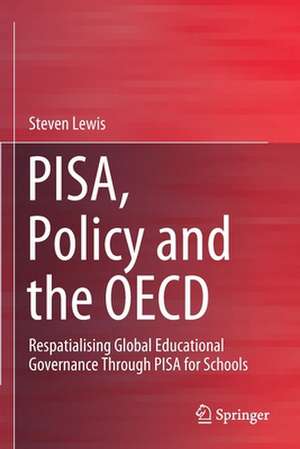PISA, Policy and the OECD: Respatialising Global Educational Governance Through PISA for Schools
Autor Steven Lewisen Limba Engleză Paperback – oct 2021
This book explores new modes, spaces and relations of the Organisation for Economic Cooperation and Development (OECD)'s global educational governance associated with the PISA for Schools test.
Adopting a theoretically-rich policy sociology approach, with an emphasis on topological understandings of spatiality and power, the book examines the entire PISA for Schools policy cycle, from its initial development, to its administration and promotion in the U.S., and its local enactment by schools and teachers. It demonstrates how PISA for Schools helps to steer how schooling is locally understood and practised through separate and yet overlapping techniques: governing by (1) heterarchy, (2) respatialisation and (3) 'best practice'.
The book reveals the specific effects of PISA for Schools as an exemplar of how global educational governance is increasingly enfolded within contemporary schooling, as well as discussing how we mightpractise a policy sociology in which the local is acknowledged as a relevant space of concern.
| Toate formatele și edițiile | Preț | Express |
|---|---|---|
| Paperback (1) | 871.16 lei 6-8 săpt. | |
| Springer Nature Singapore – oct 2021 | 871.16 lei 6-8 săpt. | |
| Hardback (1) | 877.05 lei 6-8 săpt. | |
| Springer Nature Singapore – 30 sep 2020 | 877.05 lei 6-8 săpt. |
Preț: 871.16 lei
Preț vechi: 1062.40 lei
-18% Nou
Puncte Express: 1307
Preț estimativ în valută:
166.72€ • 173.69$ • 138.62£
166.72€ • 173.69$ • 138.62£
Carte tipărită la comandă
Livrare economică 08-22 februarie 25
Preluare comenzi: 021 569.72.76
Specificații
ISBN-13: 9789811582875
ISBN-10: 9811582874
Ilustrații: XIX, 192 p. 1 illus.
Dimensiuni: 155 x 235 mm
Greutate: 0.3 kg
Ediția:1st ed. 2020
Editura: Springer Nature Singapore
Colecția Springer
Locul publicării:Singapore, Singapore
ISBN-10: 9811582874
Ilustrații: XIX, 192 p. 1 illus.
Dimensiuni: 155 x 235 mm
Greutate: 0.3 kg
Ediția:1st ed. 2020
Editura: Springer Nature Singapore
Colecția Springer
Locul publicării:Singapore, Singapore
Cuprins
Chapter 1. (Re)considering the ‘Practical Value’ Of Comparison.- Chapter 2. The Evolving State of the OECD and PISA.- Chapter 3. Topological Relations of Governance.- Chapter 4. New Networks: Policy, Philanthropy and Profit.- Chapter 5. New Cartographies: Relocating Schools In Topological Policy Spaces.- Chapter 6. New Evidence: Governing Schooling Through ‘What Works’.- Chapter 7. New Topological Spaces And Relations Of The OECD’s Global Educational Governance.- Index.
Notă biografică
Dr Steven Lewis is an Australian Research Council (ARC) DECRA Fellow at the Education Governance and Policy group within the Research for Educational Impact Centre of Deakin University. His current research interests are concerned with new modes and forms of educational accountability and data infrastructures; the education policy work of the OECD and other 'non-state' actors and organisations; and how these developments help shape the understanding and practice of schooling. He has established himself as a leading global expert on the education policy work of the OECD, and has helped further the use of spatial and relational thinking to inform generative new approaches to the study of global educational policymaking and governance.
Textul de pe ultima copertă
This book explores new modes, spaces and relations of the Organisation for Economic Cooperation and Development (OECD)'s global educational governance associated with the PISA for Schools test.
Adopting a theoretically-rich policy sociology approach, with an emphasis on topological understandings of spatiality and power, the book examines the entire PISA for Schools policy cycle, from its initial development, to its administration and promotion in the U.S., and its local enactment by schools and teachers. It demonstrates how PISA for Schools helps to steer how schooling is locally understood and practised through separate and yet overlapping techniques: governing by (1) heterarchy, (2) respatialisation and (3) 'best practice'.
The book reveals the specific effects of PISA for Schools as an exemplar of how global educational governance is increasingly enfolded within contemporary schooling, as well as discussing how we mightpractise a policy sociology in which the local is acknowledged as a relevant space of concern.
Caracteristici
Addresses the OECD's PISA for Schools and PISA4U programmes Examines how OECD policy ensembles govern local schooling policy and practice at the school and teacher level Theorizes new ways of understanding and analyzing global educational governance
